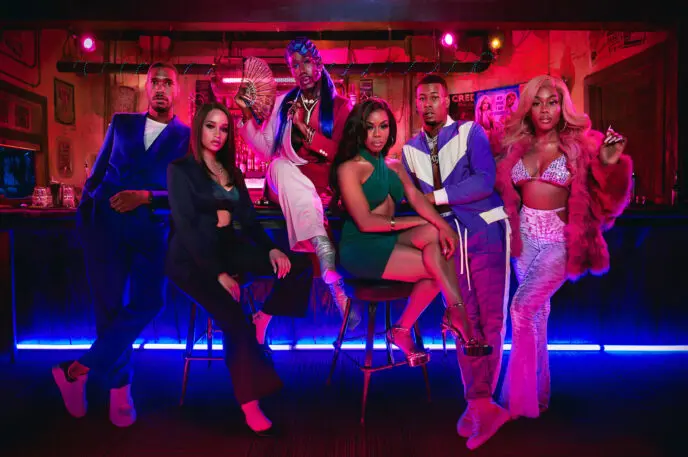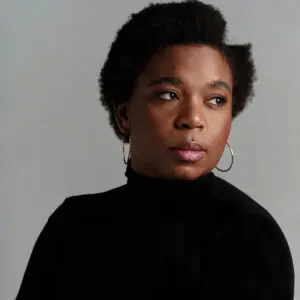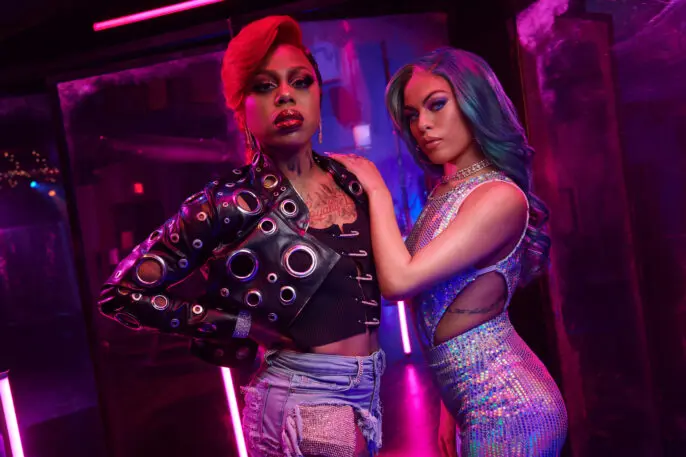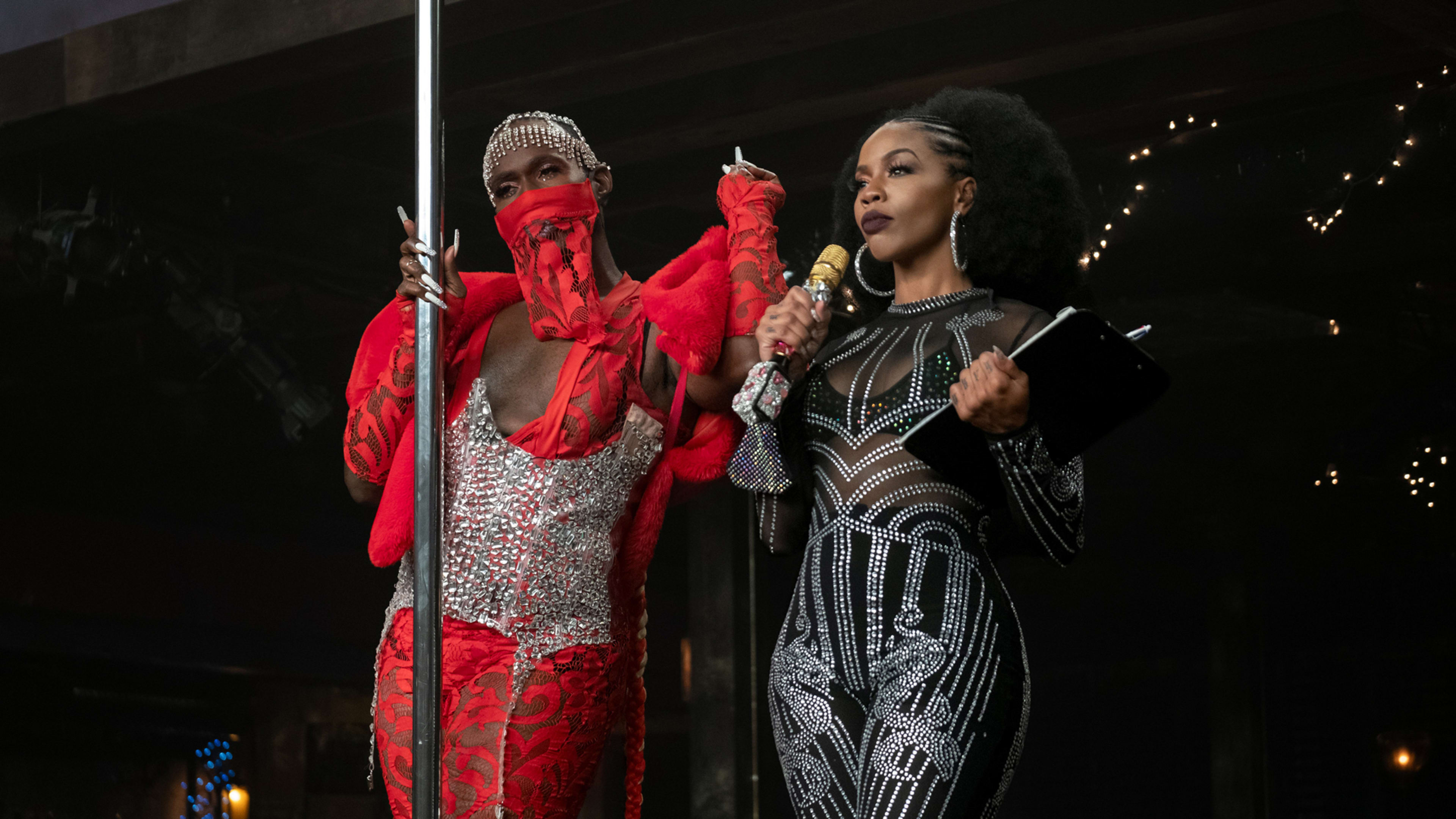Season one of P-Valley, the hit Starz show about women working in a Mississippi strip club, landed during the summer of 2020 when the world was embroiled in the beginning of a seemingly never-ending pandemic and the issue of racial injustice became a global conversation.
While many television writers have chosen to opt out of pandemic storylines, P-Valley creator Katori Hall decided to document that grim time in history in the second season premiering June 3.
“Being an artist who is Black and a woman, the virus also exposed a more rampant virus, which was racial injustice,” Hall says. “This season allowed me to dig down deep and explore all these issues.”
P-Valley is about more than stripping—it’s about a community of Black people and women who use their creativity to forge their own opportunities so they can survive in a world that seeks to limit their joy. As these beloved characters struggle—now in the face of COVID-19—it’s not just their money that’s at stake, but their livelihoods as well.
In addition to her title as P-Valley’s creator, writer, showrunner, and director, Hall is also an accomplished playwright who won the Pulitzer Prize for drama last year for her play The Hot Wing King.
Fast Company spoke to Hall about the new season of P-Valley, transitioning from theater to television, and creating opportunities for female directors.
What made you decide to have the pandemic be a part of season two?
My writing was very much inspired by it. I could not not write about one of the biggest historical events of my lifetime. Also the strip club is a live performance, and I wanted to explore the impact that a virus would have on a business that was based on gathering. The economic impact for everyone worldwide has been tremendous and incredibly detrimental. These women were already scraping and struggling last year. It felt like the perfect place to explore and see someone who works in a club that’s in the midst of this current moment in history.

Exactly. Dancers know everything. They knew a recession was coming before anybody else did!
No spoilers, but what are you hoping dedicated viewers and fans get from this second season?
Even in the first season, this theme of resilience and making a way out of no way was something that I think we imparted upon our audience. But I feel like in season two, it’s a given that these folks are going to figure out how to survive. What I think most people don’t acknowledge about survivors is about how much love they have in their heart for not only themselves but the people they’re fighting for. This season really peeled back all the layers for every single person in the show. The thing about mask wearing, you know the literal mask to protect yourself, and there’s [the proverbial mask the characters take off] over the course of the season, which I think evokes a kind of healing between characters and their relationships and the healing that has to happen within yourself.
Besides a successful the first season of P-Valley, you also won a Pulitzer Prize for drama last year for your play The Hot Wing King. What was the transition like from accomplished playwright to television showrunner?
It has been hard. When you’re writing, it’s just you and a computer and you’re wrestling the words to the ground. If it’s a play or a film idea, you might think that’s the end of the line. But with television production, especially in a showrunning position, I didn’t realize how it had to deal so much more with managing people than managing words. Particularly, this past season we were doing a show during COVID about COVID, and all that experience flew out the window. It didn’t matter how much experience you had, whether 30 or 50 years, no one was prepared to run a show during COVID. The number one thing that you needed last year, and even now, is compassion in your heart. I came into work everyday and made sure to put other’s health first. I could never make everything completely safe because it’s impossible to mitigate the risk of contracting COVID 100 percent. But I can make it safer and it makes me more empathetic. I’ve become more engaged as a leader, because being a showrunner isn’t about storytelling—it’s about creating a community.
P-Valley is based on your play Pussy Valley. And in comparison to television, you don’t have that same space on the stage. How did you go about expanding past the original source material?
A few things about plays is that they’re stories that demand witnessing. It’s about the gathering of people in the same room in the same space. You’re kind of welcoming people and their imaginations. It can be limiting, but I think it also demands that your characters be even more specific and relatable, because you’re relying on human beings. Transitioning to television, I was excited to be able to move with my characters. What was challenging was having to think about the characters’s world outside of the club. But one of the blessings about theater is that it teaches you how to create really dynamic characters so that when you take them into other mediums it gives you the chance to develop the stories further.
Last season, all the episodes were directed by women. And this second season features all female directors again, including yourself. Knowing that P-Valley centers Black women, did you take that into account during your search for directors?

I’m glad that you had that opportunity to help shape someone else’s art and vision. Is there anyone you consider a mentor, in the world of television or theater?
Someone who’s really helped shape my artistic aesthetic is the playwright Lynn Nottage. She’s a writer that is very journalistic in that she will go all around the world to get the answer. The truth speaking that I saw her do and the fact that I have my own journalistic background validated that was the best way you are articulating someone else’s truth. She became a wonderful mentor and friend. I love the way she moves in this world, because she uses art as a tool for social change. It’s a reflection of soft power and that’s what storytelling does. It’s a reflection of people and the world. In the case of her plays and P-Valley, it takes marginalized communities and humanizes them. If you’re someone who watches this show, there’s no way you can’t see a person who looks like the people on this show. You can’t denigrate them because we’ve used fiction to tell the truth of their humanity.
Do you have any plans to adapt your other plays to the screen?
I was thinking about adapting The Hot Wang King into a film or television show. I don’t want people to feel that they have to travel to a theater in order to be in the living room with my characters. That’s one of my bigger goals in the next few years. I’ve always been inspired by Tyler Perry and his ability to take his plays and turn them into shows and movies. Hollywood took notice of how his work centers on Black people across various socioeconomic levels.

Absolutely. And that’s just my mission statement in general. When it comes to my writing, I always just want to tell [the stories of] these unsung heroes. Or better yet sheroes, because it’s been too long that we have this idea that there’s only one certain type of Black person that needs to have their story written about. We have to be real about real folks. The idea that everyone’s story is important is a driving force in my work.
Recognize your brand’s excellence by applying to this year’s Brands That Matter Awards before the early-rate deadline, May 3.
